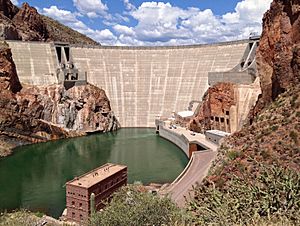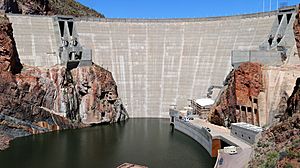Theodore Roosevelt Dam facts for kids
Quick facts for kids Theodore Roosevelt Dam |
|
|---|---|

Roosevelt Dam seen from downstream
|
|
| Country | United States |
| Location | Gila County / Maricopa County, Arizona |
| Coordinates | 33°40′18″N 111°09′40″W / 33.67167°N 111.16111°W |
| Status | Operational |
| Construction began | 1903 |
| Opening date | 1911 |
| Owner(s) | Bureau of Reclamation |
| Dam and spillways | |
| Type of dam | Arch-gravity dam |
| Impounds | Salt River, Tonto Creek |
| Height | 357 ft (109 m) |
| Length | 1,210 ft (369 m) |
| Width (crest) | 21.6 ft (6.6 m) |
| Width (base) | 196 ft (60 m) |
| Dam volume | 606,000 cu yd (463,000 m3) |
| Spillway capacity | 150,000 cu ft/s (4,200 m3/s) |
| Reservoir | |
| Creates | Theodore Roosevelt Lake |
| Total capacity | 1,653,043 acre⋅ft (2.039×109 m3) (conservation) 2,910,200 acre⋅ft (3.590×109 m3) (flood control) |
| Catchment area | 5,830 sq mi (15,100 km2) |
| Surface area | 21,493 acres (86.98 km2) (conservation) |
| Power station | |
| Operator(s) | Salt River Project |
| Hydraulic head | 249 ft (76 m) |
| Installed capacity | 36 MW (48,000 hp) |
| Designated: | 1963 |
| Delisted: | 1999 |
Theodore Roosevelt Dam is a huge dam built on the Salt River in Arizona. It is located northeast of Phoenix, Arizona. The dam is about 357 feet (109 meters) tall. It creates Theodore Roosevelt Lake by holding back the Salt River.
The dam was first built between 1905 and 1911. Later, it was made even bigger and stronger from 1989 to 1996. This important dam is named after President Theodore Roosevelt. It helps with many things, like providing water for farms, supplying drinking water, and controlling floods. It also makes electricity, producing 36 megawatts of power.
Contents
How the Dam Was Built
Finding the Perfect Spot
In 1888, a surveyor named Billy Breakenridge started looking for good places to build a dam on the Salt River. In July 1889, he went with James McClintock, William J. Murphy, and John R. Norton. They rode horses for a week to find the best spot.
They found a place called Box Canyon, where Tonto Creek meets the Salt River. They decided this was the perfect location for a dam.
Starting a Big Project
The Roosevelt Dam was one of the first big projects approved by the government. This happened on March 14, 1903, under a new law called the Newlands Reclamation Act. It was the first major project finished under this new plan.
The dam was one of the tallest masonry dams (built from stone and mortar) in the world at that time. Construction began in 1906. President Theodore Roosevelt himself opened the dam on March 18, 1911.
Powering the West
The government also started making electricity at Roosevelt Dam. In 1906, Congress allowed the Reclamation Service to create and sell hydroelectric power. This was a big step for the government in providing electricity.
The Reclamation Act of 1902 created the United States Reclamation Service. Their goal was to build irrigation projects to help people settle in the dry western parts of the country. Before this, private companies often struggled to do this. The new service showed that the government would lead these big projects.
Building Challenges and Success
Building the dam started in 1903. Its main goal was to store water for the Salt River Project. It also helped control floods in the Salt River Valley. The dam was finished in 1911, even though some big floods in 1905 made construction difficult.
The dam cost $10 million to build. At the time, it was the largest masonry dam in the world. It was 280 feet (84 meters) tall and 723 feet (216 meters) long. The lake behind it, called Roosevelt Lake, was also the world's largest artificial lake for a while.
The dam was first called "Salt River Dam #1." It wasn't until 1959 that it was officially named after Theodore Roosevelt.
A Symbol of Progress
The Roosevelt Dam was a huge success and a great example of what the new government agency could do. It helped central Arizona grow more than any other dam. It allowed for large-scale farming in the area. The dam also made a good amount of electricity. Lake Roosevelt could hold over 1.6 million acre-feet of water.
The dam was recognized as a National Historic Landmark in 1963. However, this special title was removed in 1999.
Making the Dam Even Bigger
The Expansion Project
In 1989, a big project began to make Roosevelt Dam even larger and stronger. Workers covered the dam with new concrete. They also made it 77 feet (23 meters) taller, reaching a height of 357 feet (109 meters). This made Roosevelt Lake able to hold about 20% more water.
This huge project was finished in 1996 and cost $430 million. This cost included other important construction jobs. For example, a new bridge, the Theodore Roosevelt Bridge, was built upstream of the dam for Highway 188. The hydroelectric power plant was also updated.
A New Look and Purpose
After the reconstruction, the dam looked very different. The original stone dam was completely covered in concrete. Because its appearance changed so much, it no longer had the same historical look. So, its National Historic Landmark title was removed on March 10, 1999.
Even though the dam itself is no longer a National Historic Landmark, other parts of the Theodore Roosevelt Dam area are still listed on the National Register of Historic Places.
Images for kids
 | Calvin Brent |
 | Walter T. Bailey |
 | Martha Cassell Thompson |
 | Alberta Jeannette Cassell |






